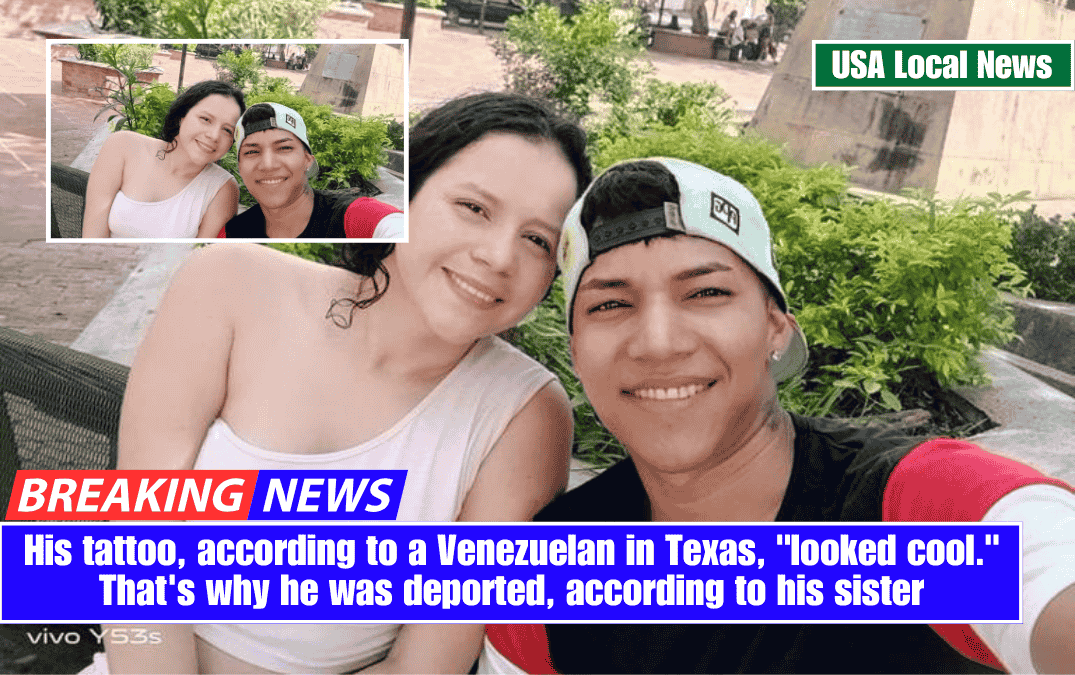Anyelo Jose Sarabia, a 19-year-old Venezuelan seeking asylum in the United States, went to a tattoo shop in Arlington last August and had a rose with money petals tattooed on his left hand.
Five months later, during a routine check-in for his asylum claim, Sarabia was detained by immigration officers. And this weekend, authorities are believed to have flown him to a prison in El Salvador with over 200 others under an obscure wartime law invoked by President Donald Trump to expedite his mass deportation campaign.
Sarabia’s sister stated in court filings this week that his deportation was due to a rose tattoo he got in Texas because “he thought it looked cool.”
Sarabia is believed to be one of many Venezuelan migrants accused by US immigration officials of being a member of Tren de Aragua, a notorious Venezuelan gang that Trump claims is “conducting irregular warfare” against the US. Over the weekend, he signed a proclamation authorizing the use of the Alien Enemies Act of 1798 to deport its members.
However, attorneys for the American Civil Liberties Union and Democracy Forward, who are challenging Trump’s use of the law, claim the administration has provided little evidence that the migrants deported to El Salvador are members of the gang.
They were not given the opportunity to challenge the claims before being flown to a foreign country, where they face prison conditions that have been described as “harsh and life-threatening.”
According to court documents, El Salvadoran prison officials use electric shocks as well as “beat, waterboard, and use implements of torture on detainees’ fingers to try to force confessions of gang affiliation.” The Trump administration is paying El Salvador to imprison alleged gang members.
Solanyer Michell Sarabia Gonzalez, Sarabia’s 25-year-old sister who is also living in Texas while she pursues her asylum application, stated in a court filing Wednesday that he has no criminal history in the United States or Venezuela and is not affiliated with any gang.
She accompanied him to their regular check-in with Immigration and Customs Enforcement on January 31. She was able to leave the appointment, but her brother was detained, she stated.
When Sarabia Gonzalez asked why her brother was not allowed to leave, the officers asked if he was a gang member and questioned her about the tattoo on his hand, she said.
“My brother is not, or was never, a member of any gang,” Sarabia Gonzalez said in a sworn statement. “He got the tattoo in August 2024 in Arlington, Texas, because he thought it looked cool. “The tattoo has no meaning or affiliation with any gang.”
Federal immigration authorities did not respond to questions about Sarabia’s case, but they stated in other court documents that their decisions were not solely based on tattoos.
On Friday, President Donald Trump stated that those deported were “a bad group” who underwent a “very strong vetting process” that will continue in El Salvador.
Trump stated that if any of the deported individuals were not members of the gang, “we would certainly want to find out.”
“We don’t want to make that kind of a mistake,” Mr. Trump said.
The filings are part of a long-running legal battle over Trump’s use of an obscure wartime law that has only been used three times before, and not since World War II, when it was used to round up Japanese, German, and Italian citizens living in the United States.
This weekend, a federal judge blocked President Trump’s use of the Alien Enemies Act to deport migrants. Two deportation flights continued to El Salvador on Saturday, despite the judge’s verbal order that they return to the United States. The White House has stated that approximately 261 people were deported on the flights, including 137 under the Alien Enemies Act.
The Trump administration has provided little information about those deported, not naming them or specifying the evidence against them. The court filings provide some of the first indications of who was caught up in the deportation sweep. On Thursday, CBS News published an internal government list of all people deported to El Salvador. The list includes Sarabia.
Trump’s use of the act comes after Governor Greg Abbott declared Tren de Aragua a foreign terrorist organization last year. Abbott directed the state’s Department of Public Safety to step up efforts to halt the gang’s operations in Texas, citing “slow but increasing activity.”
The Texas Department of Public Safety claims that stars, crowns, predatory felines, and roses can be used to identify Tren de Aragua members.
Experts, however, have questioned this. The gang operates as a loose network in the United States, and tattoos, which are common among Central American gangs, are not required for TdA members, according to Ronna Risquez, a Venezuelan journalist who wrote a book about the organization’s origins in 2023.
“Having a specific tattoo isn’t required to be a TdA member,” Risquez explained in an email in Spanish. “Some TdA members may have tattoos and others may not.”
Michael Shifter, a senior fellow at the Inter-American Dialogue, a Washington, D.C.-based nonprofit, believes TdA does not have uniform tattoos like other gangs.
“I think certain designs have been associated with the gang, but the symbols are pretty common and can be found among people with no gang affiliation,” Shifter told reporters. “Bottom line is that individuals can be easily misidentified based on tattoos.”
Nonetheless, federal authorities used tattoos as proof of gang membership in a handful of cases, according to court documents filed by the ACLU this week.
Along with Sarabia, ICE deported Jerce Reyes Barrios, a former professional soccer player from Venezuela who had sought asylum in the United States after being arrested and tortured in his home country for protesting the Maduro regime. His attorney claims that federal officials believe he is a member of Tren de Aragua because he has a tattoo of a crown atop a soccer ball with a rosary and the word “Dios,” which means God.
Federal officials have also pointed to a picture he posted on social media of himself making a hand sign, which they say proves his gang affiliation. His attorney wrote in court filings the hand sign — with his thumb, index and pinky fingers extended — means “I love you” in sign language and is commonly used as a symbol of rock and roll.
In another case, a Venezuelan tattoo artist was questioned about whether his tattoos were the apparent basis for TdA membership, according to court documents. According to the filings, they were inspired by a Google image search that led him to an eyeball design that “looked cool.”
Robert Cerna, an acting field office director for ICE, stated in a sworn statement that federal officials “carefully vetted each individual alien to ensure they were in fact members of TdA.”
To make those determinations, he stated that officers and agents “well versed in gang activity in general and TdA in particular” reviewed information such as previous criminal convictions for TdA-related activities, surveillance, testimonies and statements from TdA members’ victims, and more.
“ICE did not simply rely on social media posts, photographs of the alien displaying gang-related hand gestures, or tattoos alone,” according to him.
But Cerna acknowledged in his statement that many of the alleged members deported under the Alien Enemies Act do not have criminal records in the United States.
Cerna said that could be because they have only been in the U.S. for a short time and argued that the “lack of specific information about each individual actually highlights the risk they pose.
“It demonstrates that they are terrorists with regard to whom we lack a complete profile,” according to him.
Tren de Aragua is Venezuela’s largest criminal organization, and it has spread throughout South America as its members prey on migrants fleeing the country, charging them fees to smuggle them into other countries and trafficking others for sexual exploitation, according to InSight Crime, a think tank that tracks organized crime.
Experts say the gang is active in the U.S. and should be taken seriously. But they say its reach has been exaggerated by Trump and others on the right, and it is so far not something that American law enforcement cannot handle.















